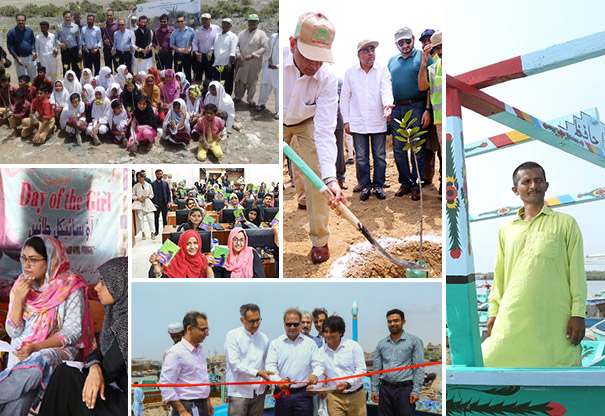entrepreneurship program – empowering coastal communities
Engro Vopak partnered with WWF Pakistan, partnered to implement the project titled Sustainable Fisheries Entrepreneurship Program – a citizen-based approach to saving Pakistan’s unique marine environment. Phase 1 of the project began in July 2016 and ended in December 2018. In light of the success achieved under the first phase, Engro Vopak agreed to continue the project for another phase i.e. Phase II starting in January 2019 and in December 2021.
Phase II of the project is being implemented in the two target Union Councils of Rehri and Ibrahim Hyderi in Karachi. The project intends to partner with the existing and new fisher groups, Sindh and Marine fisheries departments and other relevant government departments, and the private sector. SFEP Phase II aimed at addressing some of the key contributors to the problems of the marine and coastal ecosystems. The project aims to support and promote improved fisheries management in 2 UCs of Karachi, by reforming fisheries governance and management to combat illegal fishing and reduce pressure on marine ecosystems through increased awareness.
After the successful completion of phases I & II and considering the project’s impact, Engro Vopak has decided to initiate phase III, commencing on January 1, 2022, and concluding on December 31, 2024. Phase III of the Sustainable Fisheries Enhancement Program (SFEP) aims to address key contributors to marine and coastal ecosystem challenges. The project intends to bolster improved fisheries management by reforming governance and management practices to combat illegal fishing and alleviate pressure on marine ecosystems through heightened awareness. The primary focus of Phase III is on reducing post-harvest losses, curbing illegal fishing practices, and minimizing excessive fishing efforts, thereby encouraging fishers to avoid depleting the marine food chain. These objectives are pursued to ensure sustained enhancements in the fishing knowledge, attitudes, and practices (FKAP) of fishers in Ibrahim Hyderi and Rehri villages, as well as to improve the livelihoods and health conditions of fisher-folk households. Throughout the year, the project team successfully outfitted five vessels in Ibrahim Hyderi and Rehri with longline equipment, benefiting 120 crew members. This conversion from gillnet to longline gear is aimed at promoting sustainable fishing practices and mitigating the adverse effects of gillnet fishing. SFEP also distributed a total of 105 fishing assets, including 25 insulated iceboxes, 40 boat engine-repair toolkits, and 40 safety kits among underpriviledged fishermen in Ibrahim Hyderi and Rehri Goth. Furthermore, over 500 female fishers received training on health and hygiene sessions, and participated in clean-up drives, aiming to raise awareness and reduce plastic pollution and waste disposal in coastal waters. Additionally, SFEP phase III introduced an Android mobile application for fish catch data collection.
Training initiatives, including the development of animated videos and the training of 20 master trainers and 60 fishers, have significantly enhanced fishing practices, leading to evidence-based data collection and scientific publications. Moreover, the provision of skill development training for 14 fisherwomen and subsequent support for establishing home-based enterprises have not only empowered women but also diversified livelihood opportunities.
From 2018 to 2023, the project has successfully trained over 2900+ fisherfolk on sustainable fisheries management and organizational skills. Additionally, more than 1100+ fisherfolk have received assets, benefiting over 7000 people indirectly. Nature club activities engaged 1500 students and 400 youth, while over 2500+ fisherfolk benefited from environmental awareness programs. Trainings have covered various fishing practices, including longline techniques, improving target catch, reducing bycatch, minimizing plastic waste, and enhancing storage methods. Furthermore, three boat owners have been equipped with longline sets containing 200 circle hooks each. Our team has also distributed 190 iceboxes with a capacity of 70 liters and 50 toolkits within the community to promote sustainable fishing practices.

